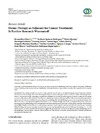Please use this identifier to cite or link to this item:
https://accedacris.ulpgc.es/jspui/handle/10553/42330
| Title: | Ozone therapy as adjuvant for cancer treatment: Is further research warranted? | Authors: | Clavo Varas, Bernardino Santana, Norberto Llontop, Pedro Gutiérrez, Dominga Suárez, Gerardo López Ríos,Laura Rovira, Gloria Martínez-Sánchez, Gregorio González, Esteban Jorge, Ignacio J. Perera, Carmen Blanco, Jesús Rodríguez-Esparragon, Francisco |
UNESCO Clasification: | 32 Ciencias médicas | Keywords: | Animal Experimental Examinations Spinal-Cord Stimulation Tumor Oxygenation Chromosome Breakage Hyperbaric-Oxygen, et al |
Issue Date: | 2018 | Publisher: | 1741-427X | Project: | Instituto de Salud Carlos III (Grants: INT07/30; INT07/172; PI 10/01485) Fundación Canaria de Investigación y Salud (FUNCIS) (Grants: PI 31/98 (study involving patients with head and neck cancer); PI 2/05 (study involving patients with brain tumor)) |
Journal: | Evidence-Based Complementary and Alternative Medicine | Abstract: | Introduction. This article provides an overview of the potential use of ozone as an adjuvant during cancer treatment. Methods. We summarize the findings of the most relevant publications focused on this goal, and we include our related clinical experience. Results. Over several decades, prestigious journals have published in vitro studies on the capacity of ozone to induce direct damage on tumor cells and, as well, to enhance the effects of radiotherapy and chemotherapy. Indirect effects have been demonstrated in animal models: immune modulation by ozone alone and sensitizing effect of radiotherapy by concurrent ozone administration. The effects of ozone in modifying hemoglobin dissociation curve, 2,3-diphosphoglycerate levels, locoregional blood flow, and tumor hypoxia provide additional support for potential beneficial effects during cancer treatment. Unfortunately, only a few clinical studies are available. Finally, we describe some works and our experience supporting the potential role of local ozone therapy in treating delayed healing after tumor resection, to avoid delays in commencing radiotherapy and chemotherapy. Conclusions. In vitro and animal studies, as well as isolated clinical reports, suggest the potential role of ozone as an adjuvant during radiotherapy and/or chemotherapy. However, further research, such as randomized clinical trials, is required to demonstrate its potential usefulness as an adjuvant therapeutic tool. | URI: | https://accedacris.ulpgc.es/handle/10553/42330 | ISSN: | 1741-427X | DOI: | 10.1155/2018/7931849 | Source: | Evidence-Based Complementary And Alternative Medicine[ISSN 1741-427X], v. 2018, (Septiembre 2018), 7931849 |
| Appears in Collections: | Artículos |
SCOPUSTM
Citations
50
checked on Jun 8, 2025
WEB OF SCIENCETM
Citations
43
checked on Feb 1, 2026
Page view(s) 5
391
checked on Jan 15, 2026
Download(s)
173
checked on Jan 15, 2026
Google ScholarTM
Check
Altmetric
Share
Export metadata
Items in accedaCRIS are protected by copyright, with all rights reserved, unless otherwise indicated.
